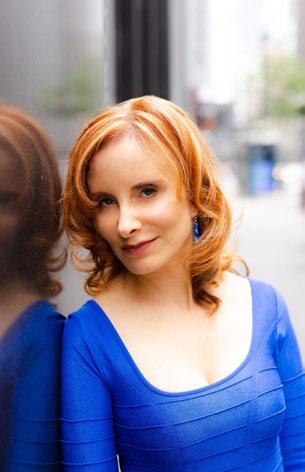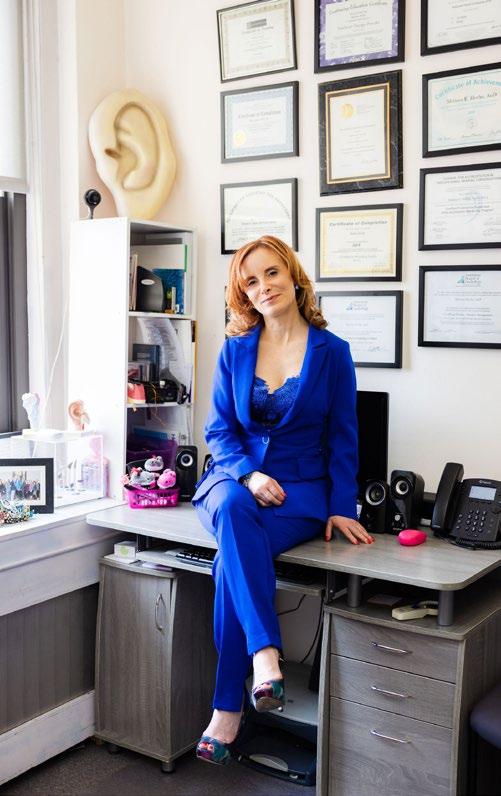
3 minute read
MERGING PASSION WITH A PROFESSION: SOUND TWISTS IN CAREER
from 25A July 2023
by 25A Magazine

By Dr. Melissa E. Heche, AuD
Advertisement
s a child, I always knew that I wanted to be a performer…. a Broadway Star, like Bernadette Peters or Bette Midler. I studied voice and acting from the time I was a child and participated in local and regional theatre until I was a teenager, when I started auditioning professionally. At that time, I studied musical theatre more formally and honed my skills as a musician on vocals and percussion. Being a performer was completely my career plan.
Until it wasn’t.
As a musician and performer in regional theatre and television, I was focused on making it my lifetime career despite any uncertainties in the industry. Then, a twist of fate steered me in a different direction - during a voice and diction class in a college theatre program, I was exposed to several different dialects and accents. Learning about the linguistic structure of different accents led to a course on acoustics, which led to a path towards speech pathology and audiology. I continued to audition and perform while pursuing degrees in both disciplines. I became certified in accent acquisition/reduction, a skill that I used both in my own performances and in vocal/speech training for other performers. That kept me in the performance space. Ultimately, however, it was the marriage of acoustics, music and hearing that led me on a path towards a musicbased audiology practice.
In my practice of diagnosing and treating hearing loss, I became interested in the similarities between programming hearing aids and mixing music on a soundboard. The frequency bands in the hearing aid software were reminiscent of faders on the mixing board, and many of the adjustable parameters translated in both forums. Recognizing this, I looked at the relationship between sound modification, music, speech perception and the brain response. To better understand these relationships, and to fill a void that I felt was left by my graduate education, I became a sound engineer. This allowed me to better understand technology and branch music, sound, audiology and speech communication to help my patients more effectively.
Shortly after, I began incorporating music within my private audiology practice. I use music as a part of my therapeutic methods - treating hearing loss, processing loss and tinnitus. Then, I began to focus on the hearing healthcare needs of the music industry. I provided education to musicians with respect to their exposure to noise/loud music and its potential impact on their hearing function. I performed specialized hearing protection fittings and counseled on healthy hearing practices for professional and avocational musicians.
Eventually, I began speaking on these topics to musicians and industry professionals at trade shows such as NAMM (National
Association of Music Merchants) and AES (Audio Engineering Society). Now I work with several major manufacturers of musician products to help industry professionals choose the sound best suited for their specific instrument, genre of music, and hearing configuration. I continue to provide support to ensure optimal fit and sound and to confirm that the right steps are being taken for hearing preservation. Since loud noise exposure can still impact both the auditory system and brain processing, even with the use of musician products to aid in protection, I provide follow-up services to monitor function and diagnose or treat any issues that arise. As a tinnitus specialist, I support and treat one of the most handicapping repercussions of loud noise exposure and the paralyzing cousin to hearing loss.
Throughout the years of developing this specialized practice, the term “music audiologist” was developed within the audiology field. I am proud to be one of a handful of practitioners who specialize in the intersection between music, sound and hearing and who handle its impact on the auditory system. The understanding of sound and its relationship to music/speech and brain processing is helpful to treat all types of damage to the auditory system and in keeping the auditory system healthy. Circling my passion into my profession, I am proud to have merged my background in hearing healthcare with my knowledge of sound and music. This has allowed me to provide a more comprehensive treatment service for anyone with damage or a risk of damage to the auditory system. I am wholeheartedly proud to be navigating this field by utilizing my experience as a performer and musician to provide a necessary service to industry professionals.
Despite my pride in my career trajectory, I have not completely lost the desire to perform. On any given weekend, I can be found on one of the small stages in the NY area. The most amazing part about being in New York City is that there are still opportunities for performers while integrating with a career. This allows me the opportunity to continue to participate in her passion of performing and, in doing so, gives me the benefit of that perspective from the hearing healthcare space. This allows me to better support music industry individuals. Creating a profession built from a passion has given me the knowledge and experience from my professional experience while also understanding the point of view of those who are seeking help. The circle created has allowed me a better capacity to provide support and be a hearing healthcare advocate for music industry professionals.











